Partnership with Families and Communities in Early Childhood Education
VerifiedAdded on 2021/01/02
|10
|2763
|196
Report
AI Summary
This report delves into the significance of leadership theories within early childhood care settings, emphasizing their crucial role in enhancing child development through effective partnerships with families and communities. It examines pedagogical leadership, highlighting its focus on quality improvement and family involvement, and contrasts it with instructional approaches. The report explores the leadership capability framework, identifying qualities of educational leaders that facilitate collaboration and support for families. It also analyzes the concept of distributed leadership, recognizing its potential and associated challenges in the context of child development. Furthermore, the report provides an overview of principles and issues related to family-community partnerships, including Bronfenbrenner's ecological model, and concludes with strategic planning for implementing effective leadership practices, such as conjoint behavioral consultation mapping to enhance quality and outcomes in early childhood education.
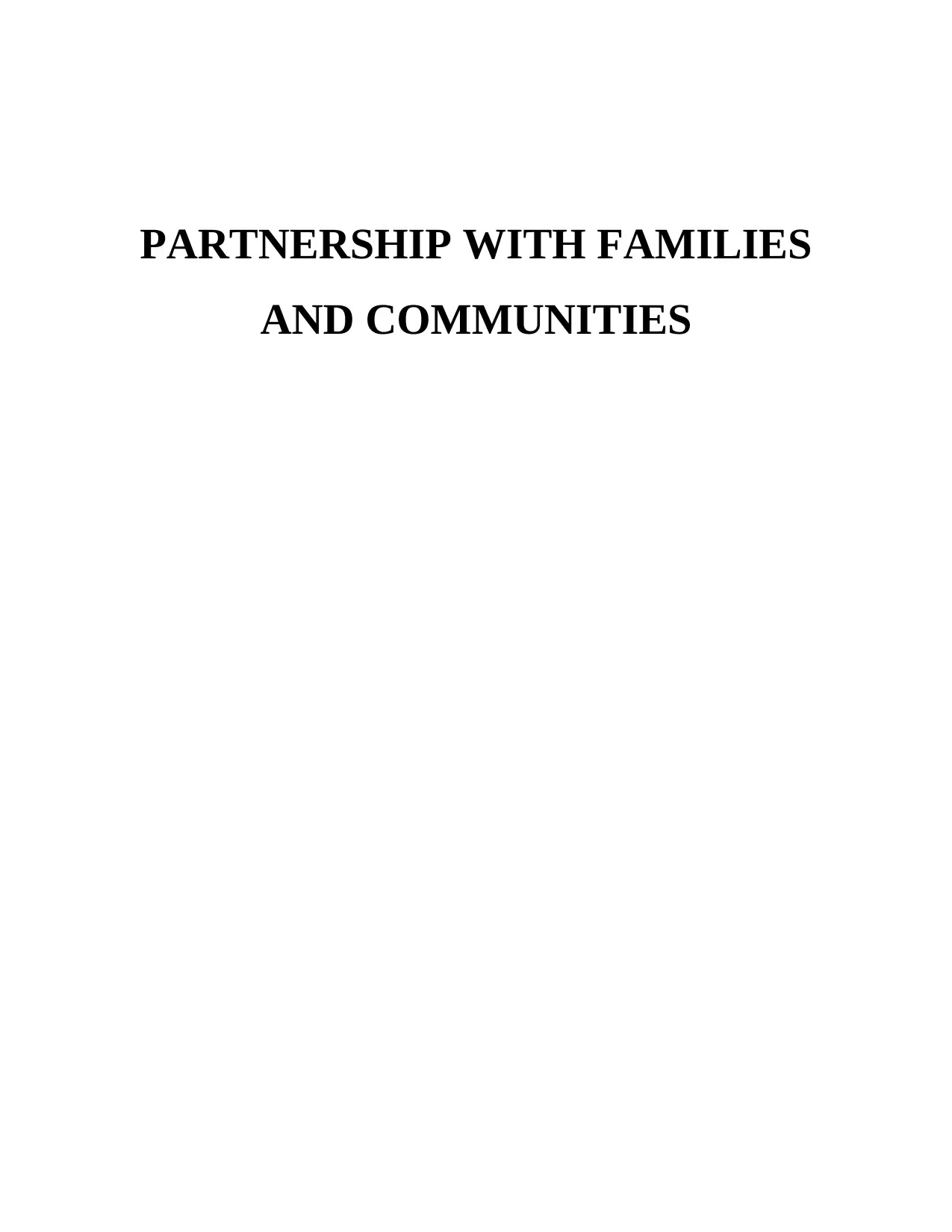
PARTNERSHIP WITH FAMILIES
AND COMMUNITIES
AND COMMUNITIES
Paraphrase This Document
Need a fresh take? Get an instant paraphrase of this document with our AI Paraphraser
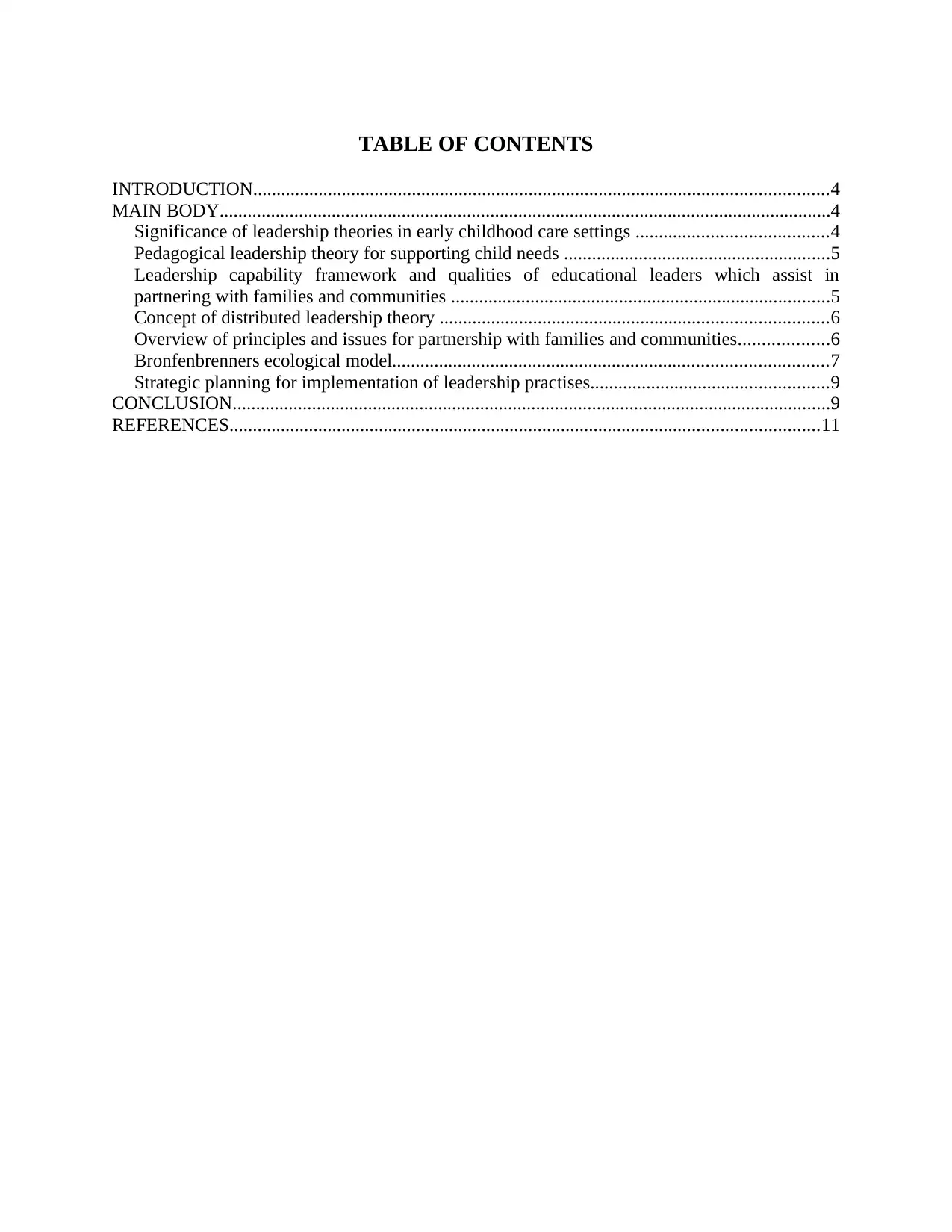
TABLE OF CONTENTS
INTRODUCTION...........................................................................................................................4
MAIN BODY...................................................................................................................................4
Significance of leadership theories in early childhood care settings .........................................4
Pedagogical leadership theory for supporting child needs .........................................................5
Leadership capability framework and qualities of educational leaders which assist in
partnering with families and communities .................................................................................5
Concept of distributed leadership theory ...................................................................................6
Overview of principles and issues for partnership with families and communities...................6
Bronfenbrenners ecological model.............................................................................................7
Strategic planning for implementation of leadership practises...................................................9
CONCLUSION................................................................................................................................9
REFERENCES..............................................................................................................................11
INTRODUCTION...........................................................................................................................4
MAIN BODY...................................................................................................................................4
Significance of leadership theories in early childhood care settings .........................................4
Pedagogical leadership theory for supporting child needs .........................................................5
Leadership capability framework and qualities of educational leaders which assist in
partnering with families and communities .................................................................................5
Concept of distributed leadership theory ...................................................................................6
Overview of principles and issues for partnership with families and communities...................6
Bronfenbrenners ecological model.............................................................................................7
Strategic planning for implementation of leadership practises...................................................9
CONCLUSION................................................................................................................................9
REFERENCES..............................................................................................................................11
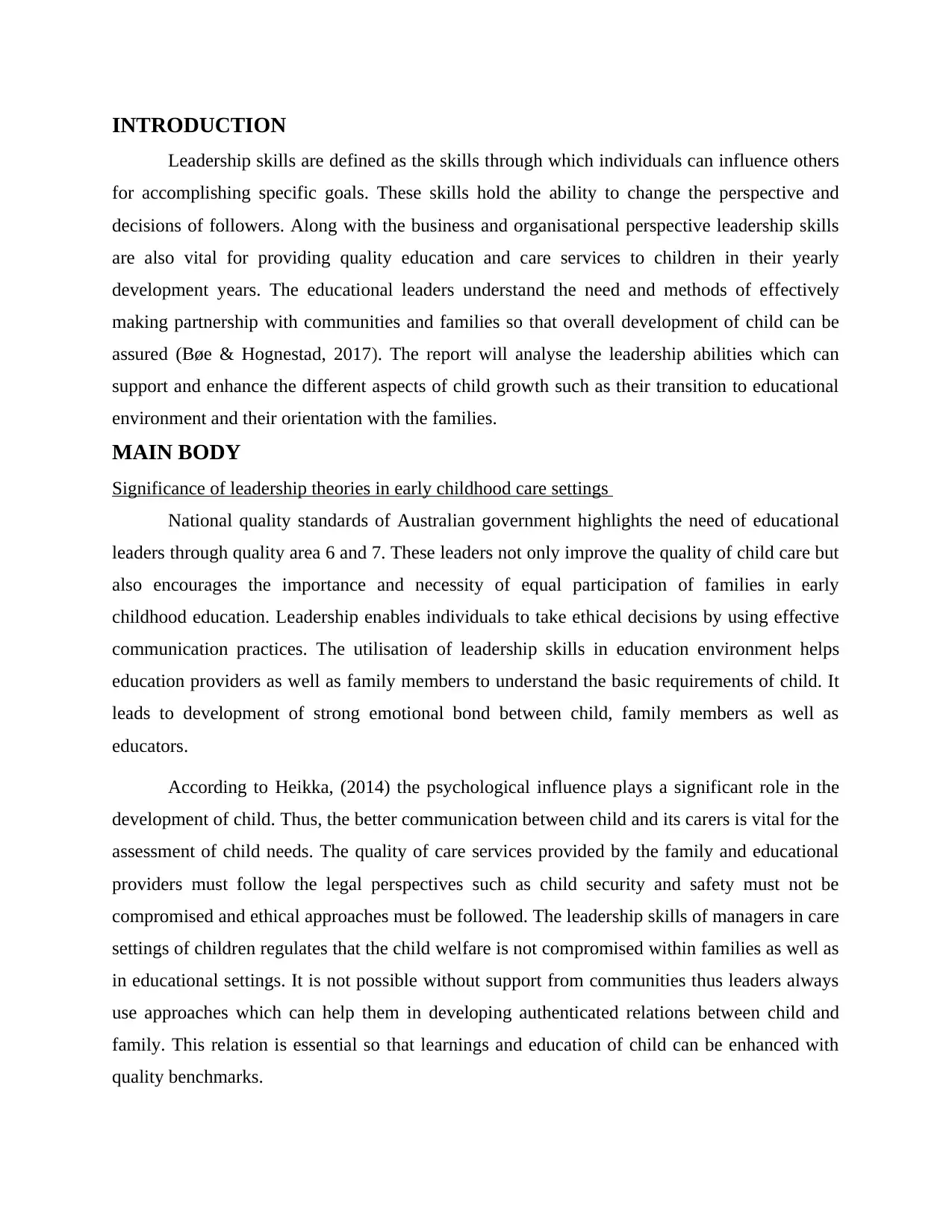
INTRODUCTION
Leadership skills are defined as the skills through which individuals can influence others
for accomplishing specific goals. These skills hold the ability to change the perspective and
decisions of followers. Along with the business and organisational perspective leadership skills
are also vital for providing quality education and care services to children in their yearly
development years. The educational leaders understand the need and methods of effectively
making partnership with communities and families so that overall development of child can be
assured (Bøe & Hognestad, 2017). The report will analyse the leadership abilities which can
support and enhance the different aspects of child growth such as their transition to educational
environment and their orientation with the families.
MAIN BODY
Significance of leadership theories in early childhood care settings
National quality standards of Australian government highlights the need of educational
leaders through quality area 6 and 7. These leaders not only improve the quality of child care but
also encourages the importance and necessity of equal participation of families in early
childhood education. Leadership enables individuals to take ethical decisions by using effective
communication practices. The utilisation of leadership skills in education environment helps
education providers as well as family members to understand the basic requirements of child. It
leads to development of strong emotional bond between child, family members as well as
educators.
According to Heikka, (2014) the psychological influence plays a significant role in the
development of child. Thus, the better communication between child and its carers is vital for the
assessment of child needs. The quality of care services provided by the family and educational
providers must follow the legal perspectives such as child security and safety must not be
compromised and ethical approaches must be followed. The leadership skills of managers in care
settings of children regulates that the child welfare is not compromised within families as well as
in educational settings. It is not possible without support from communities thus leaders always
use approaches which can help them in developing authenticated relations between child and
family. This relation is essential so that learnings and education of child can be enhanced with
quality benchmarks.
Leadership skills are defined as the skills through which individuals can influence others
for accomplishing specific goals. These skills hold the ability to change the perspective and
decisions of followers. Along with the business and organisational perspective leadership skills
are also vital for providing quality education and care services to children in their yearly
development years. The educational leaders understand the need and methods of effectively
making partnership with communities and families so that overall development of child can be
assured (Bøe & Hognestad, 2017). The report will analyse the leadership abilities which can
support and enhance the different aspects of child growth such as their transition to educational
environment and their orientation with the families.
MAIN BODY
Significance of leadership theories in early childhood care settings
National quality standards of Australian government highlights the need of educational
leaders through quality area 6 and 7. These leaders not only improve the quality of child care but
also encourages the importance and necessity of equal participation of families in early
childhood education. Leadership enables individuals to take ethical decisions by using effective
communication practices. The utilisation of leadership skills in education environment helps
education providers as well as family members to understand the basic requirements of child. It
leads to development of strong emotional bond between child, family members as well as
educators.
According to Heikka, (2014) the psychological influence plays a significant role in the
development of child. Thus, the better communication between child and its carers is vital for the
assessment of child needs. The quality of care services provided by the family and educational
providers must follow the legal perspectives such as child security and safety must not be
compromised and ethical approaches must be followed. The leadership skills of managers in care
settings of children regulates that the child welfare is not compromised within families as well as
in educational settings. It is not possible without support from communities thus leaders always
use approaches which can help them in developing authenticated relations between child and
family. This relation is essential so that learnings and education of child can be enhanced with
quality benchmarks.
⊘ This is a preview!⊘
Do you want full access?
Subscribe today to unlock all pages.

Trusted by 1+ million students worldwide
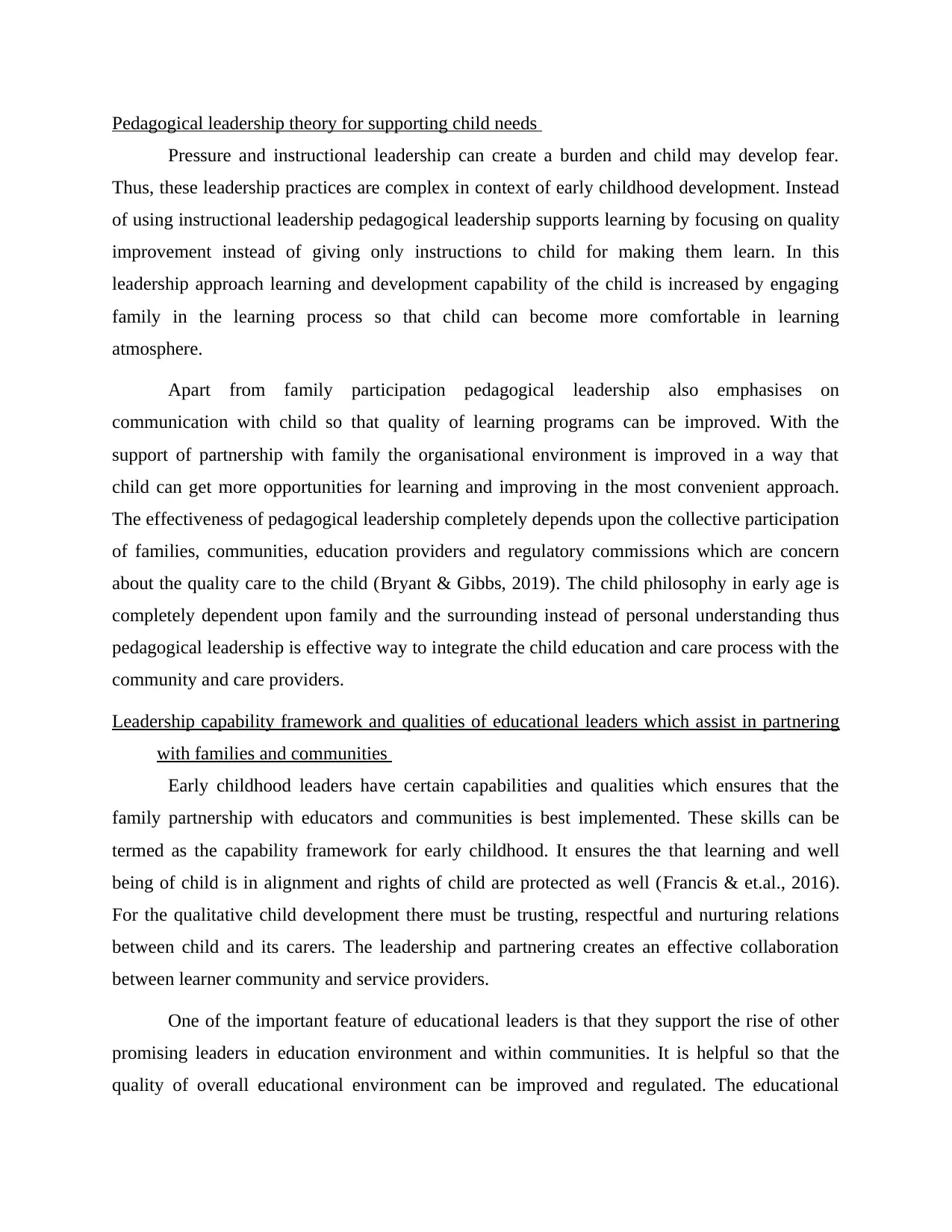
Pedagogical leadership theory for supporting child needs
Pressure and instructional leadership can create a burden and child may develop fear.
Thus, these leadership practices are complex in context of early childhood development. Instead
of using instructional leadership pedagogical leadership supports learning by focusing on quality
improvement instead of giving only instructions to child for making them learn. In this
leadership approach learning and development capability of the child is increased by engaging
family in the learning process so that child can become more comfortable in learning
atmosphere.
Apart from family participation pedagogical leadership also emphasises on
communication with child so that quality of learning programs can be improved. With the
support of partnership with family the organisational environment is improved in a way that
child can get more opportunities for learning and improving in the most convenient approach.
The effectiveness of pedagogical leadership completely depends upon the collective participation
of families, communities, education providers and regulatory commissions which are concern
about the quality care to the child (Bryant & Gibbs, 2019). The child philosophy in early age is
completely dependent upon family and the surrounding instead of personal understanding thus
pedagogical leadership is effective way to integrate the child education and care process with the
community and care providers.
Leadership capability framework and qualities of educational leaders which assist in partnering
with families and communities
Early childhood leaders have certain capabilities and qualities which ensures that the
family partnership with educators and communities is best implemented. These skills can be
termed as the capability framework for early childhood. It ensures the that learning and well
being of child is in alignment and rights of child are protected as well (Francis & et.al., 2016).
For the qualitative child development there must be trusting, respectful and nurturing relations
between child and its carers. The leadership and partnering creates an effective collaboration
between learner community and service providers.
One of the important feature of educational leaders is that they support the rise of other
promising leaders in education environment and within communities. It is helpful so that the
quality of overall educational environment can be improved and regulated. The educational
Pressure and instructional leadership can create a burden and child may develop fear.
Thus, these leadership practices are complex in context of early childhood development. Instead
of using instructional leadership pedagogical leadership supports learning by focusing on quality
improvement instead of giving only instructions to child for making them learn. In this
leadership approach learning and development capability of the child is increased by engaging
family in the learning process so that child can become more comfortable in learning
atmosphere.
Apart from family participation pedagogical leadership also emphasises on
communication with child so that quality of learning programs can be improved. With the
support of partnership with family the organisational environment is improved in a way that
child can get more opportunities for learning and improving in the most convenient approach.
The effectiveness of pedagogical leadership completely depends upon the collective participation
of families, communities, education providers and regulatory commissions which are concern
about the quality care to the child (Bryant & Gibbs, 2019). The child philosophy in early age is
completely dependent upon family and the surrounding instead of personal understanding thus
pedagogical leadership is effective way to integrate the child education and care process with the
community and care providers.
Leadership capability framework and qualities of educational leaders which assist in partnering
with families and communities
Early childhood leaders have certain capabilities and qualities which ensures that the
family partnership with educators and communities is best implemented. These skills can be
termed as the capability framework for early childhood. It ensures the that learning and well
being of child is in alignment and rights of child are protected as well (Francis & et.al., 2016).
For the qualitative child development there must be trusting, respectful and nurturing relations
between child and its carers. The leadership and partnering creates an effective collaboration
between learner community and service providers.
One of the important feature of educational leaders is that they support the rise of other
promising leaders in education environment and within communities. It is helpful so that the
quality of overall educational environment can be improved and regulated. The educational
Paraphrase This Document
Need a fresh take? Get an instant paraphrase of this document with our AI Paraphraser
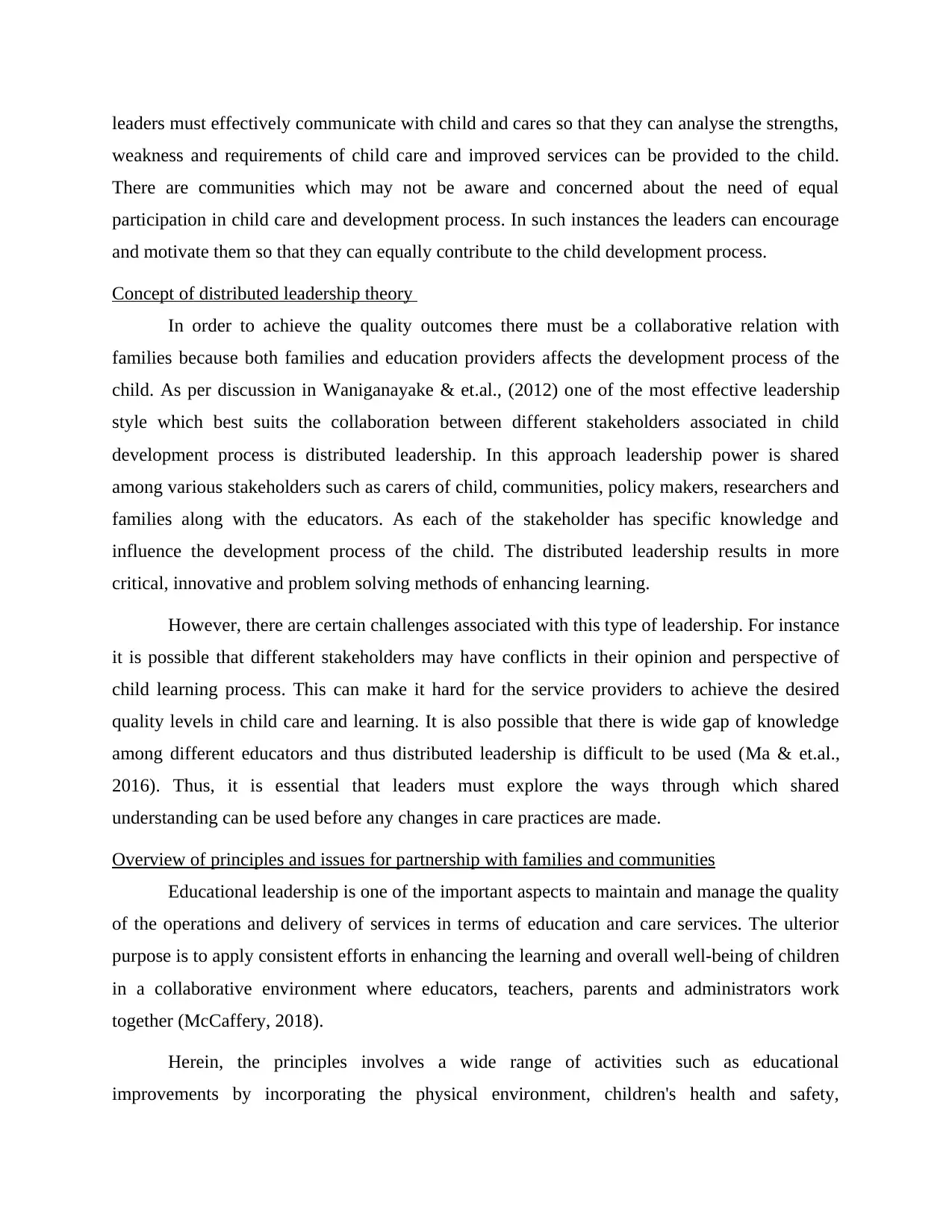
leaders must effectively communicate with child and cares so that they can analyse the strengths,
weakness and requirements of child care and improved services can be provided to the child.
There are communities which may not be aware and concerned about the need of equal
participation in child care and development process. In such instances the leaders can encourage
and motivate them so that they can equally contribute to the child development process.
Concept of distributed leadership theory
In order to achieve the quality outcomes there must be a collaborative relation with
families because both families and education providers affects the development process of the
child. As per discussion in Waniganayake & et.al., (2012) one of the most effective leadership
style which best suits the collaboration between different stakeholders associated in child
development process is distributed leadership. In this approach leadership power is shared
among various stakeholders such as carers of child, communities, policy makers, researchers and
families along with the educators. As each of the stakeholder has specific knowledge and
influence the development process of the child. The distributed leadership results in more
critical, innovative and problem solving methods of enhancing learning.
However, there are certain challenges associated with this type of leadership. For instance
it is possible that different stakeholders may have conflicts in their opinion and perspective of
child learning process. This can make it hard for the service providers to achieve the desired
quality levels in child care and learning. It is also possible that there is wide gap of knowledge
among different educators and thus distributed leadership is difficult to be used (Ma & et.al.,
2016). Thus, it is essential that leaders must explore the ways through which shared
understanding can be used before any changes in care practices are made.
Overview of principles and issues for partnership with families and communities
Educational leadership is one of the important aspects to maintain and manage the quality
of the operations and delivery of services in terms of education and care services. The ulterior
purpose is to apply consistent efforts in enhancing the learning and overall well-being of children
in a collaborative environment where educators, teachers, parents and administrators work
together (McCaffery, 2018).
Herein, the principles involves a wide range of activities such as educational
improvements by incorporating the physical environment, children's health and safety,
weakness and requirements of child care and improved services can be provided to the child.
There are communities which may not be aware and concerned about the need of equal
participation in child care and development process. In such instances the leaders can encourage
and motivate them so that they can equally contribute to the child development process.
Concept of distributed leadership theory
In order to achieve the quality outcomes there must be a collaborative relation with
families because both families and education providers affects the development process of the
child. As per discussion in Waniganayake & et.al., (2012) one of the most effective leadership
style which best suits the collaboration between different stakeholders associated in child
development process is distributed leadership. In this approach leadership power is shared
among various stakeholders such as carers of child, communities, policy makers, researchers and
families along with the educators. As each of the stakeholder has specific knowledge and
influence the development process of the child. The distributed leadership results in more
critical, innovative and problem solving methods of enhancing learning.
However, there are certain challenges associated with this type of leadership. For instance
it is possible that different stakeholders may have conflicts in their opinion and perspective of
child learning process. This can make it hard for the service providers to achieve the desired
quality levels in child care and learning. It is also possible that there is wide gap of knowledge
among different educators and thus distributed leadership is difficult to be used (Ma & et.al.,
2016). Thus, it is essential that leaders must explore the ways through which shared
understanding can be used before any changes in care practices are made.
Overview of principles and issues for partnership with families and communities
Educational leadership is one of the important aspects to maintain and manage the quality
of the operations and delivery of services in terms of education and care services. The ulterior
purpose is to apply consistent efforts in enhancing the learning and overall well-being of children
in a collaborative environment where educators, teachers, parents and administrators work
together (McCaffery, 2018).
Herein, the principles involves a wide range of activities such as educational
improvements by incorporating the physical environment, children's health and safety,
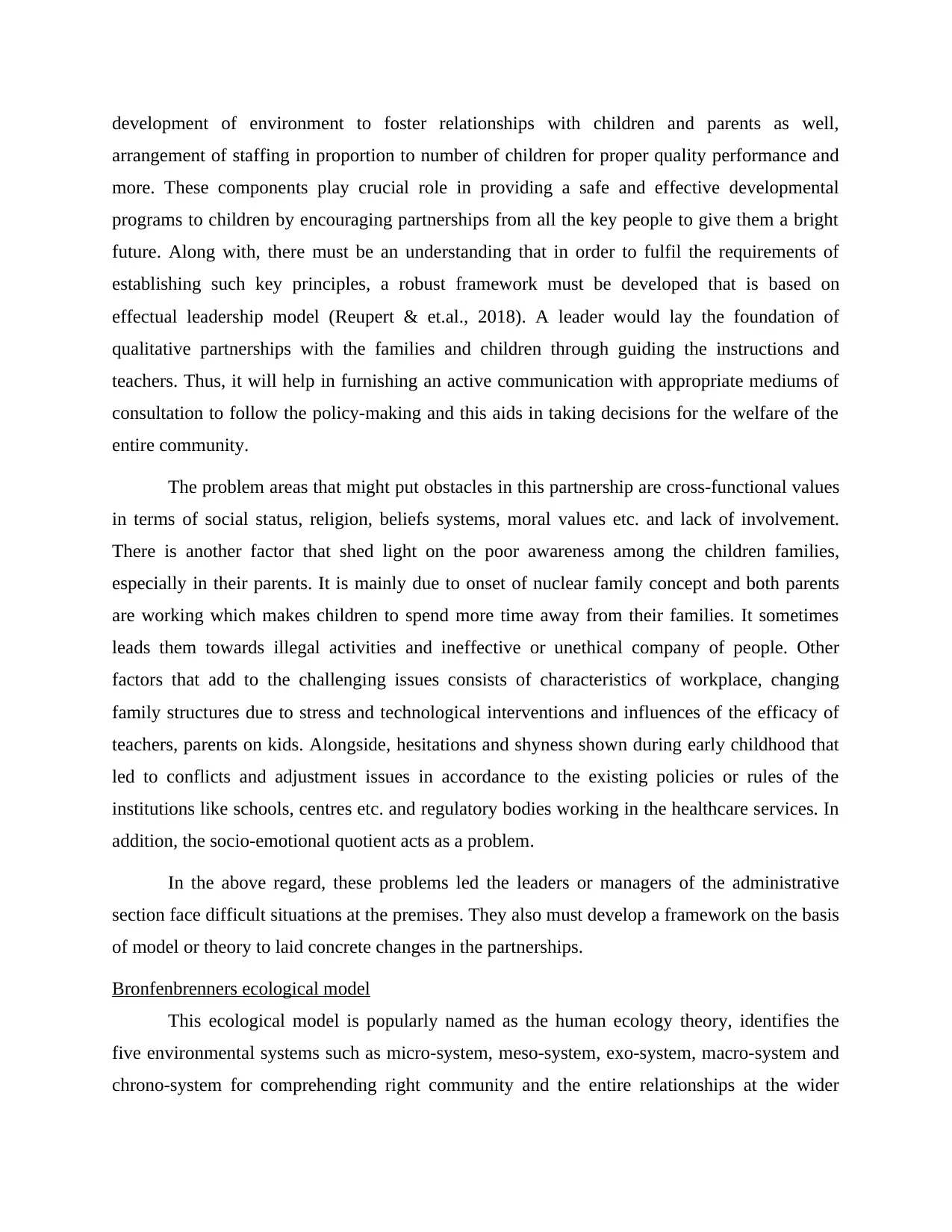
development of environment to foster relationships with children and parents as well,
arrangement of staffing in proportion to number of children for proper quality performance and
more. These components play crucial role in providing a safe and effective developmental
programs to children by encouraging partnerships from all the key people to give them a bright
future. Along with, there must be an understanding that in order to fulfil the requirements of
establishing such key principles, a robust framework must be developed that is based on
effectual leadership model (Reupert & et.al., 2018). A leader would lay the foundation of
qualitative partnerships with the families and children through guiding the instructions and
teachers. Thus, it will help in furnishing an active communication with appropriate mediums of
consultation to follow the policy-making and this aids in taking decisions for the welfare of the
entire community.
The problem areas that might put obstacles in this partnership are cross-functional values
in terms of social status, religion, beliefs systems, moral values etc. and lack of involvement.
There is another factor that shed light on the poor awareness among the children families,
especially in their parents. It is mainly due to onset of nuclear family concept and both parents
are working which makes children to spend more time away from their families. It sometimes
leads them towards illegal activities and ineffective or unethical company of people. Other
factors that add to the challenging issues consists of characteristics of workplace, changing
family structures due to stress and technological interventions and influences of the efficacy of
teachers, parents on kids. Alongside, hesitations and shyness shown during early childhood that
led to conflicts and adjustment issues in accordance to the existing policies or rules of the
institutions like schools, centres etc. and regulatory bodies working in the healthcare services. In
addition, the socio-emotional quotient acts as a problem.
In the above regard, these problems led the leaders or managers of the administrative
section face difficult situations at the premises. They also must develop a framework on the basis
of model or theory to laid concrete changes in the partnerships.
Bronfenbrenners ecological model
This ecological model is popularly named as the human ecology theory, identifies the
five environmental systems such as micro-system, meso-system, exo-system, macro-system and
chrono-system for comprehending right community and the entire relationships at the wider
arrangement of staffing in proportion to number of children for proper quality performance and
more. These components play crucial role in providing a safe and effective developmental
programs to children by encouraging partnerships from all the key people to give them a bright
future. Along with, there must be an understanding that in order to fulfil the requirements of
establishing such key principles, a robust framework must be developed that is based on
effectual leadership model (Reupert & et.al., 2018). A leader would lay the foundation of
qualitative partnerships with the families and children through guiding the instructions and
teachers. Thus, it will help in furnishing an active communication with appropriate mediums of
consultation to follow the policy-making and this aids in taking decisions for the welfare of the
entire community.
The problem areas that might put obstacles in this partnership are cross-functional values
in terms of social status, religion, beliefs systems, moral values etc. and lack of involvement.
There is another factor that shed light on the poor awareness among the children families,
especially in their parents. It is mainly due to onset of nuclear family concept and both parents
are working which makes children to spend more time away from their families. It sometimes
leads them towards illegal activities and ineffective or unethical company of people. Other
factors that add to the challenging issues consists of characteristics of workplace, changing
family structures due to stress and technological interventions and influences of the efficacy of
teachers, parents on kids. Alongside, hesitations and shyness shown during early childhood that
led to conflicts and adjustment issues in accordance to the existing policies or rules of the
institutions like schools, centres etc. and regulatory bodies working in the healthcare services. In
addition, the socio-emotional quotient acts as a problem.
In the above regard, these problems led the leaders or managers of the administrative
section face difficult situations at the premises. They also must develop a framework on the basis
of model or theory to laid concrete changes in the partnerships.
Bronfenbrenners ecological model
This ecological model is popularly named as the human ecology theory, identifies the
five environmental systems such as micro-system, meso-system, exo-system, macro-system and
chrono-system for comprehending right community and the entire relationships at the wider
⊘ This is a preview!⊘
Do you want full access?
Subscribe today to unlock all pages.

Trusted by 1+ million students worldwide
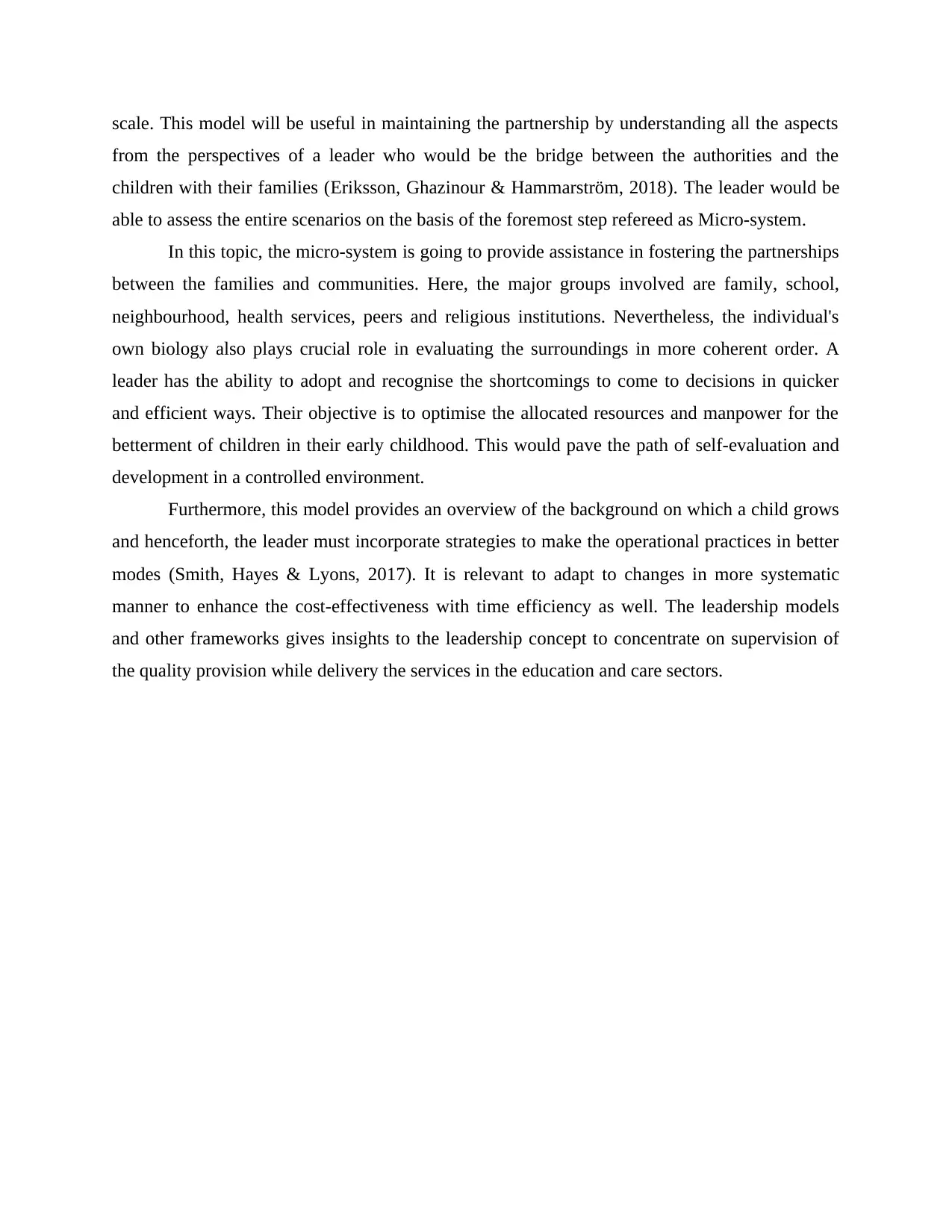
scale. This model will be useful in maintaining the partnership by understanding all the aspects
from the perspectives of a leader who would be the bridge between the authorities and the
children with their families (Eriksson, Ghazinour & Hammarström, 2018). The leader would be
able to assess the entire scenarios on the basis of the foremost step refereed as Micro-system.
In this topic, the micro-system is going to provide assistance in fostering the partnerships
between the families and communities. Here, the major groups involved are family, school,
neighbourhood, health services, peers and religious institutions. Nevertheless, the individual's
own biology also plays crucial role in evaluating the surroundings in more coherent order. A
leader has the ability to adopt and recognise the shortcomings to come to decisions in quicker
and efficient ways. Their objective is to optimise the allocated resources and manpower for the
betterment of children in their early childhood. This would pave the path of self-evaluation and
development in a controlled environment.
Furthermore, this model provides an overview of the background on which a child grows
and henceforth, the leader must incorporate strategies to make the operational practices in better
modes (Smith, Hayes & Lyons, 2017). It is relevant to adapt to changes in more systematic
manner to enhance the cost-effectiveness with time efficiency as well. The leadership models
and other frameworks gives insights to the leadership concept to concentrate on supervision of
the quality provision while delivery the services in the education and care sectors.
from the perspectives of a leader who would be the bridge between the authorities and the
children with their families (Eriksson, Ghazinour & Hammarström, 2018). The leader would be
able to assess the entire scenarios on the basis of the foremost step refereed as Micro-system.
In this topic, the micro-system is going to provide assistance in fostering the partnerships
between the families and communities. Here, the major groups involved are family, school,
neighbourhood, health services, peers and religious institutions. Nevertheless, the individual's
own biology also plays crucial role in evaluating the surroundings in more coherent order. A
leader has the ability to adopt and recognise the shortcomings to come to decisions in quicker
and efficient ways. Their objective is to optimise the allocated resources and manpower for the
betterment of children in their early childhood. This would pave the path of self-evaluation and
development in a controlled environment.
Furthermore, this model provides an overview of the background on which a child grows
and henceforth, the leader must incorporate strategies to make the operational practices in better
modes (Smith, Hayes & Lyons, 2017). It is relevant to adapt to changes in more systematic
manner to enhance the cost-effectiveness with time efficiency as well. The leadership models
and other frameworks gives insights to the leadership concept to concentrate on supervision of
the quality provision while delivery the services in the education and care sectors.
Paraphrase This Document
Need a fresh take? Get an instant paraphrase of this document with our AI Paraphraser
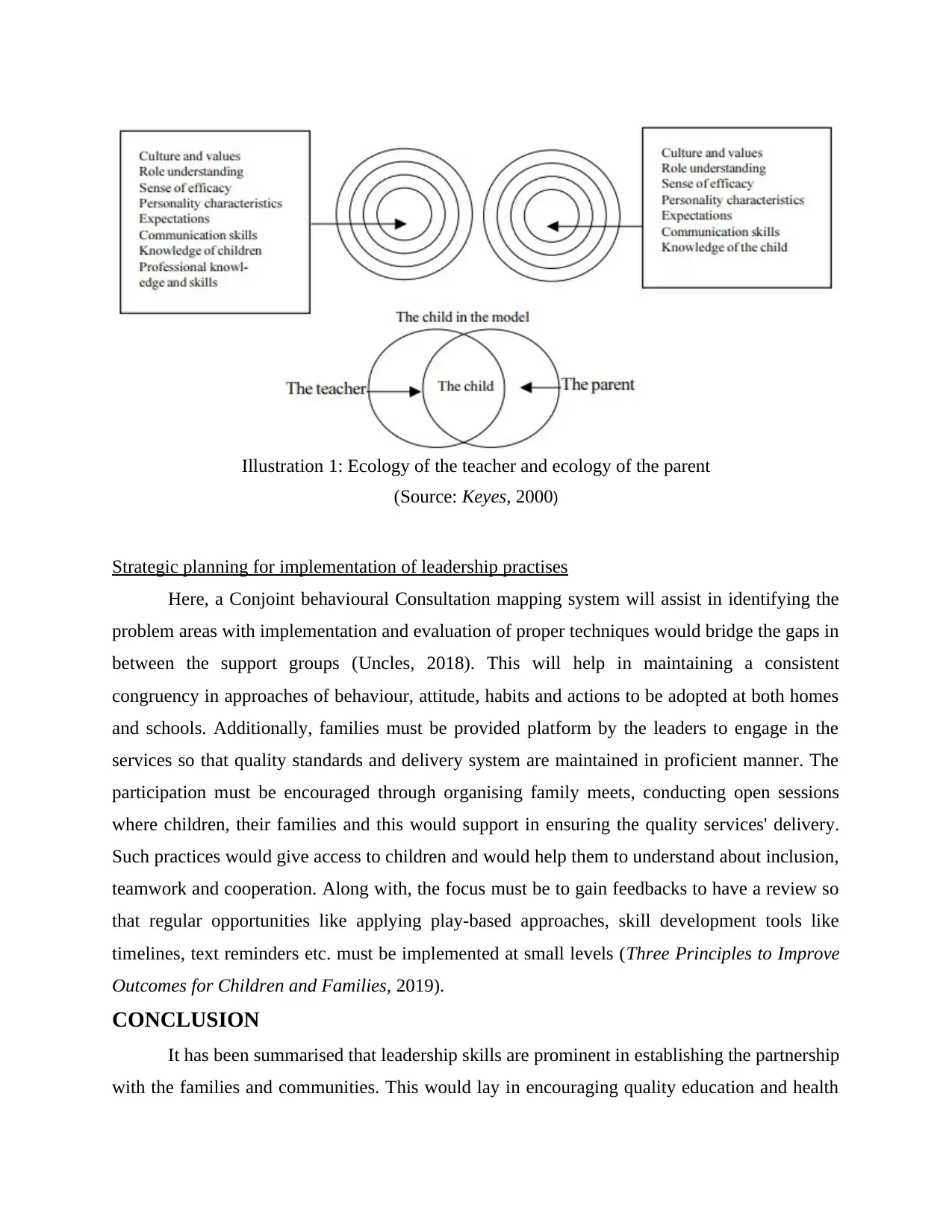
Strategic planning for implementation of leadership practises
Here, a Conjoint behavioural Consultation mapping system will assist in identifying the
problem areas with implementation and evaluation of proper techniques would bridge the gaps in
between the support groups (Uncles, 2018). This will help in maintaining a consistent
congruency in approaches of behaviour, attitude, habits and actions to be adopted at both homes
and schools. Additionally, families must be provided platform by the leaders to engage in the
services so that quality standards and delivery system are maintained in proficient manner. The
participation must be encouraged through organising family meets, conducting open sessions
where children, their families and this would support in ensuring the quality services' delivery.
Such practices would give access to children and would help them to understand about inclusion,
teamwork and cooperation. Along with, the focus must be to gain feedbacks to have a review so
that regular opportunities like applying play-based approaches, skill development tools like
timelines, text reminders etc. must be implemented at small levels (Three Principles to Improve
Outcomes for Children and Families, 2019).
CONCLUSION
It has been summarised that leadership skills are prominent in establishing the partnership
with the families and communities. This would lay in encouraging quality education and health
Illustration 1: Ecology of the teacher and ecology of the parent
(Source: Keyes, 2000)
Here, a Conjoint behavioural Consultation mapping system will assist in identifying the
problem areas with implementation and evaluation of proper techniques would bridge the gaps in
between the support groups (Uncles, 2018). This will help in maintaining a consistent
congruency in approaches of behaviour, attitude, habits and actions to be adopted at both homes
and schools. Additionally, families must be provided platform by the leaders to engage in the
services so that quality standards and delivery system are maintained in proficient manner. The
participation must be encouraged through organising family meets, conducting open sessions
where children, their families and this would support in ensuring the quality services' delivery.
Such practices would give access to children and would help them to understand about inclusion,
teamwork and cooperation. Along with, the focus must be to gain feedbacks to have a review so
that regular opportunities like applying play-based approaches, skill development tools like
timelines, text reminders etc. must be implemented at small levels (Three Principles to Improve
Outcomes for Children and Families, 2019).
CONCLUSION
It has been summarised that leadership skills are prominent in establishing the partnership
with the families and communities. This would lay in encouraging quality education and health
Illustration 1: Ecology of the teacher and ecology of the parent
(Source: Keyes, 2000)
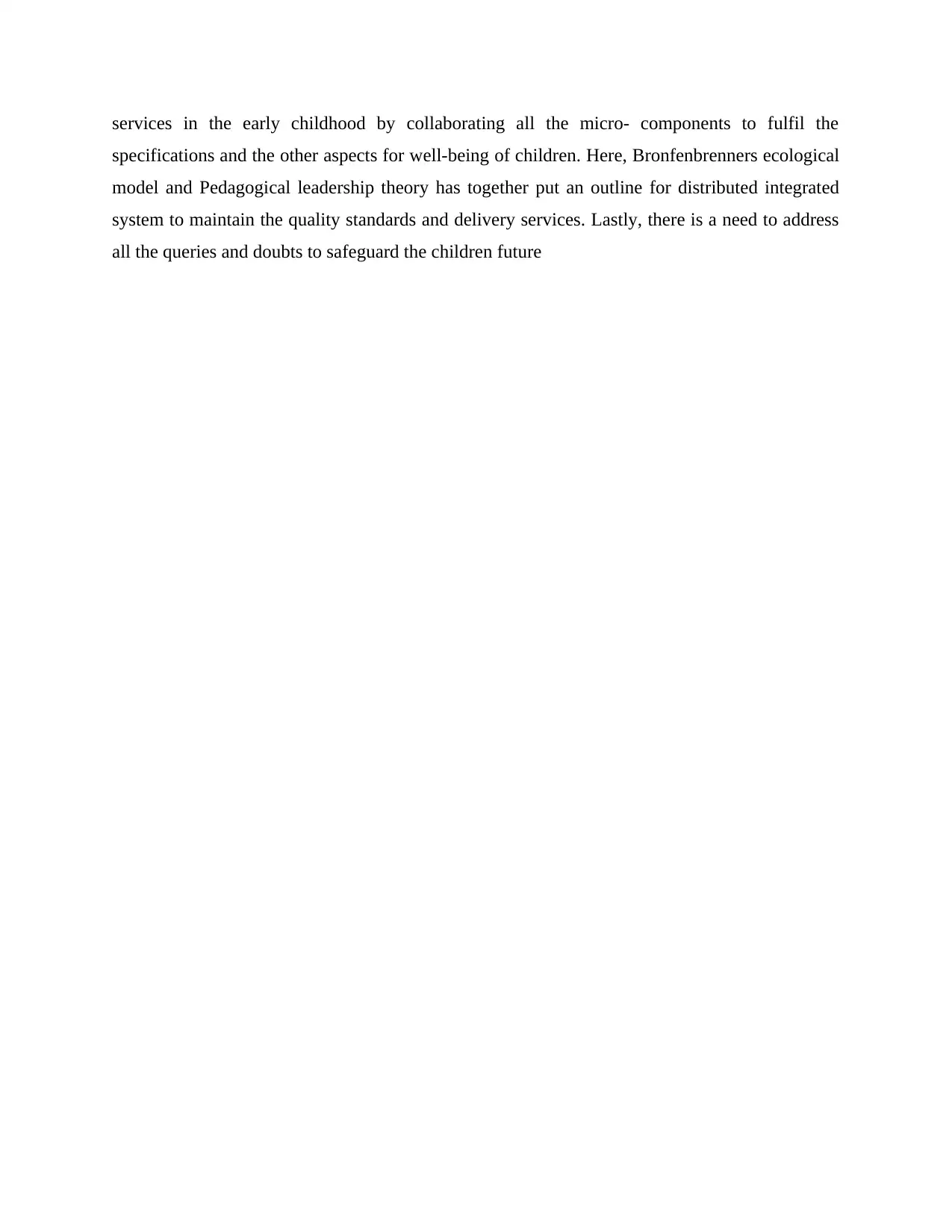
services in the early childhood by collaborating all the micro- components to fulfil the
specifications and the other aspects for well-being of children. Here, Bronfenbrenners ecological
model and Pedagogical leadership theory has together put an outline for distributed integrated
system to maintain the quality standards and delivery services. Lastly, there is a need to address
all the queries and doubts to safeguard the children future
specifications and the other aspects for well-being of children. Here, Bronfenbrenners ecological
model and Pedagogical leadership theory has together put an outline for distributed integrated
system to maintain the quality standards and delivery services. Lastly, there is a need to address
all the queries and doubts to safeguard the children future
⊘ This is a preview!⊘
Do you want full access?
Subscribe today to unlock all pages.

Trusted by 1+ million students worldwide
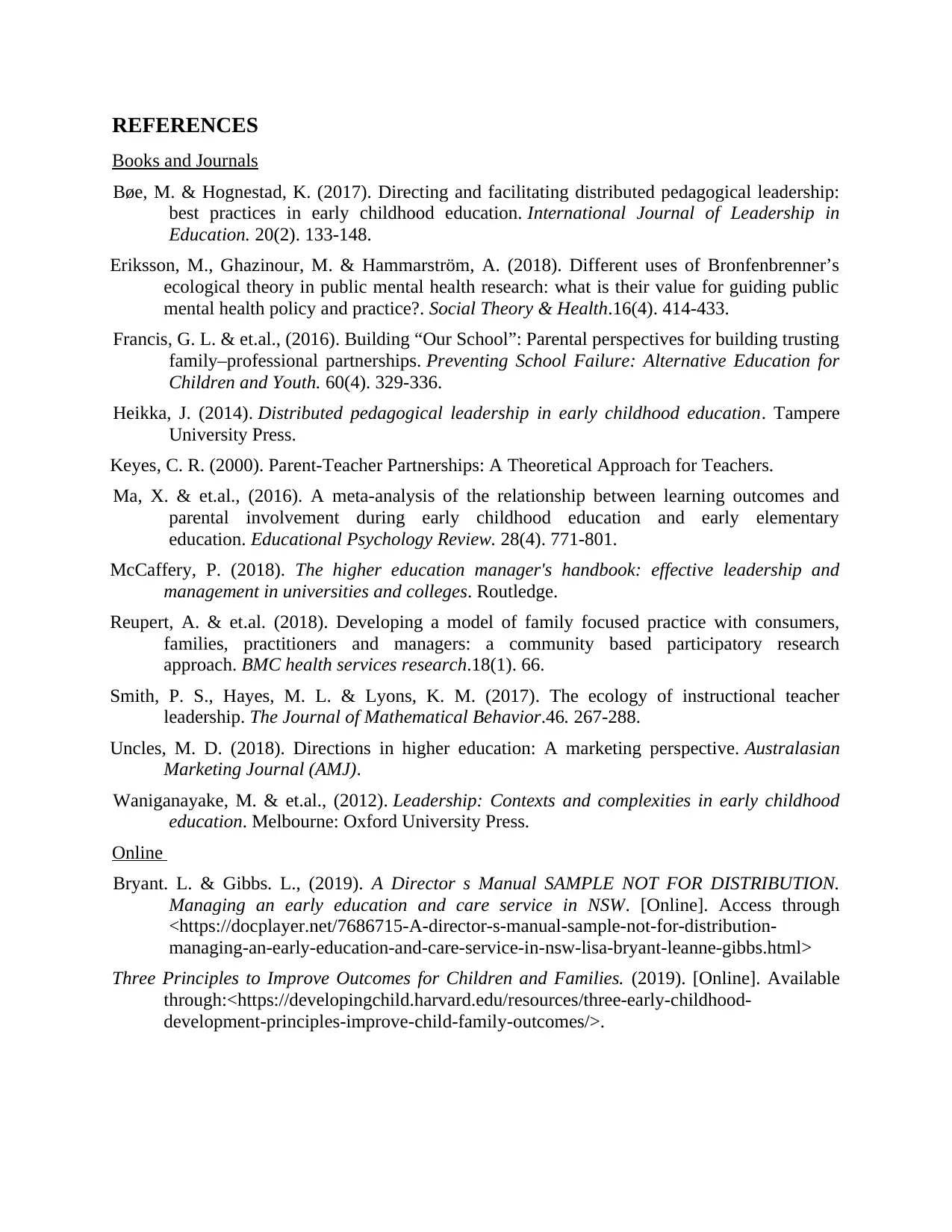
REFERENCES
Books and Journals
Bøe, M. & Hognestad, K. (2017). Directing and facilitating distributed pedagogical leadership:
best practices in early childhood education. International Journal of Leadership in
Education. 20(2). 133-148.
Eriksson, M., Ghazinour, M. & Hammarström, A. (2018). Different uses of Bronfenbrenner’s
ecological theory in public mental health research: what is their value for guiding public
mental health policy and practice?. Social Theory & Health.16(4). 414-433.
Francis, G. L. & et.al., (2016). Building “Our School”: Parental perspectives for building trusting
family–professional partnerships. Preventing School Failure: Alternative Education for
Children and Youth. 60(4). 329-336.
Heikka, J. (2014). Distributed pedagogical leadership in early childhood education. Tampere
University Press.
Keyes, C. R. (2000). Parent-Teacher Partnerships: A Theoretical Approach for Teachers.
Ma, X. & et.al., (2016). A meta-analysis of the relationship between learning outcomes and
parental involvement during early childhood education and early elementary
education. Educational Psychology Review. 28(4). 771-801.
McCaffery, P. (2018). The higher education manager's handbook: effective leadership and
management in universities and colleges. Routledge.
Reupert, A. & et.al. (2018). Developing a model of family focused practice with consumers,
families, practitioners and managers: a community based participatory research
approach. BMC health services research.18(1). 66.
Smith, P. S., Hayes, M. L. & Lyons, K. M. (2017). The ecology of instructional teacher
leadership. The Journal of Mathematical Behavior.46. 267-288.
Uncles, M. D. (2018). Directions in higher education: A marketing perspective. Australasian
Marketing Journal (AMJ).
Waniganayake, M. & et.al., (2012). Leadership: Contexts and complexities in early childhood
education. Melbourne: Oxford University Press.
Online
Bryant. L. & Gibbs. L., (2019). A Director s Manual SAMPLE NOT FOR DISTRIBUTION.
Managing an early education and care service in NSW. [Online]. Access through
<https://docplayer.net/7686715-A-director-s-manual-sample-not-for-distribution-
managing-an-early-education-and-care-service-in-nsw-lisa-bryant-leanne-gibbs.html>
Three Principles to Improve Outcomes for Children and Families. (2019). [Online]. Available
through:<https://developingchild.harvard.edu/resources/three-early-childhood-
development-principles-improve-child-family-outcomes/>.
Books and Journals
Bøe, M. & Hognestad, K. (2017). Directing and facilitating distributed pedagogical leadership:
best practices in early childhood education. International Journal of Leadership in
Education. 20(2). 133-148.
Eriksson, M., Ghazinour, M. & Hammarström, A. (2018). Different uses of Bronfenbrenner’s
ecological theory in public mental health research: what is their value for guiding public
mental health policy and practice?. Social Theory & Health.16(4). 414-433.
Francis, G. L. & et.al., (2016). Building “Our School”: Parental perspectives for building trusting
family–professional partnerships. Preventing School Failure: Alternative Education for
Children and Youth. 60(4). 329-336.
Heikka, J. (2014). Distributed pedagogical leadership in early childhood education. Tampere
University Press.
Keyes, C. R. (2000). Parent-Teacher Partnerships: A Theoretical Approach for Teachers.
Ma, X. & et.al., (2016). A meta-analysis of the relationship between learning outcomes and
parental involvement during early childhood education and early elementary
education. Educational Psychology Review. 28(4). 771-801.
McCaffery, P. (2018). The higher education manager's handbook: effective leadership and
management in universities and colleges. Routledge.
Reupert, A. & et.al. (2018). Developing a model of family focused practice with consumers,
families, practitioners and managers: a community based participatory research
approach. BMC health services research.18(1). 66.
Smith, P. S., Hayes, M. L. & Lyons, K. M. (2017). The ecology of instructional teacher
leadership. The Journal of Mathematical Behavior.46. 267-288.
Uncles, M. D. (2018). Directions in higher education: A marketing perspective. Australasian
Marketing Journal (AMJ).
Waniganayake, M. & et.al., (2012). Leadership: Contexts and complexities in early childhood
education. Melbourne: Oxford University Press.
Online
Bryant. L. & Gibbs. L., (2019). A Director s Manual SAMPLE NOT FOR DISTRIBUTION.
Managing an early education and care service in NSW. [Online]. Access through
<https://docplayer.net/7686715-A-director-s-manual-sample-not-for-distribution-
managing-an-early-education-and-care-service-in-nsw-lisa-bryant-leanne-gibbs.html>
Three Principles to Improve Outcomes for Children and Families. (2019). [Online]. Available
through:<https://developingchild.harvard.edu/resources/three-early-childhood-
development-principles-improve-child-family-outcomes/>.
1 out of 10
Related Documents
Your All-in-One AI-Powered Toolkit for Academic Success.
+13062052269
info@desklib.com
Available 24*7 on WhatsApp / Email
![[object Object]](/_next/static/media/star-bottom.7253800d.svg)
Unlock your academic potential
Copyright © 2020–2026 A2Z Services. All Rights Reserved. Developed and managed by ZUCOL.




